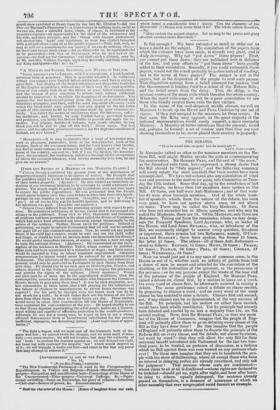FROM THE REPORT OF A MEETING OF THE WORKING CLASSES.]
" Citizen Derisly considered the present state of the distribution of property extremely injurious to all classes of society. He thought that the grandees ought to yield to the public common stock about nine-tenths of their landed property. (Applause.) He also viewed art immediate re- duction of our enormous taxation to be necessary to avoid a national ex- plosion. The people ought to petition the Legislature over and over again to reduce the public expenditure. He was persuaded that the People would prove helpless were they ever to take matters into their own hands : perhaps he was singular in his opinion. (Laughter, and cries of ' True,' yes') At all events this was his humble opinion, and in delivering it his intention was good. (Laughter and applause.) " Citizen Cleave differed from the preceding speaker with regard to peti- tions. He considered petitioning of no use, except that it encouraged ob- stinacy in the petitioned. From 1814 to 1819, thousands and thousands of petitions had been presented to the place called the House of Commons, which had never been attended nor answered, except occasionally by the sabres of the soldiery. Neither House cared for petitions. Instead of petitioning, we ought to inform Government that we will not be satisfied nor quiet till we had obtained concession. Now, he would ask any parent there, if his child had a cancer, would he wait and see the child suffer and linger, or would he have an incision made and deracinate the disease ? He.would prefer immediate incision, of course ; and this is how we ought to treat the national disease. (Applause.) He commented on the insur- rection of the workmen at Merthyr Tydvil, whose conduct he justified; these riots had been occasioned by a reduction of wages ; and these scenes would'he repeated as long as labour remained unprotected. Adequate remuneration for labour would never be enforced by an aristocratical Parliament. The interests of the operatives, mechanics, and labourers in general, could only be protected in Parliament hymen chosen from. their own class. He should like to see such men as Hetherington, Warden, and others, deputed to the National Assembly, there to expose the grievances and protect the rights of the millions. (Great applause.) Would not such men be of more use to the unprotected multitude, than the contemptible, moustached dandies and idlers who frequent the Commons House, merely to pass away their time ? It was by such despicable, use- less automatons as these latter, that a bill praying for the reduction of the labour of children in manufactories to eleven hours duration was opposed I For his part, he thought even five hours work was by far too much for a child ; he would rather dash out the brains of his chil- dren than allow them to slave so many hours per day. These matters would never be taken into consideration till the House of Representa- tives contained the representatives of the poor. He hoped shortly to see in that House deputies representing the whole people, and to see a Govern- ment willing and capable of affording protection to the wealth-producers. Although he was not a young man, he hoped to live to see a cheap, efficient REPUBLICAN form of -Government substituted for the present inefficient, expensive, tax-devouring system. (Loud expressions of appro. bation.)"


























 Previous page
Previous page